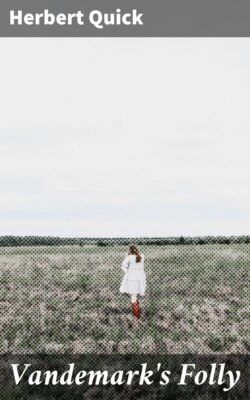Читать книгу Vandemark's Folly - Quick Herbert - Страница 14
На сайте Литреса книга снята с продажи.
I SEE THE WORLD, AND SUFFER A GREAT LOSS
ОглавлениеTable of Contents
The strange thing to me about my fight with Ace was that nobody thought of such a thing as punishing me for it. I was free to fight or not as I pleased. I needed to be free more than anything else, and I wanted plenty of good food and fresh air. All these I got, for Captain Sproule, while stern and strict with us, enforced only those rules which were for the good of the boat, and these seemed like perfect liberty to me--after I whipped Ace. As for my old tyrant, he recovered his spirits very soon, and took the place of an underling quite contentedly. I suppose he had been used to it. I ruled in a manner much milder than his. I had never learned to swear--or to use harder words than gosh, and blast, and dang where the others swore the most fearful oaths as a matter of ordinary talk. I made a rule that Ace must quit swearing; and slapped him up to a peak a few times for not obeying--which was really a hard thing for him to do while driving; and when he was in a quarrel I always overlooked his cursing, because he could not fight successfully unless he had the right to work himself up into a passion by calling names and swearing.
As for myself I walked and rode erect and felt my limbs as light as feathers, as compared with their leaden weight when I lived at Tempe and worked in the factory. Soon I took on my share of the fighting as a matter of course. I did it as a rule without anger and found that beyond a bloody nose or a scratched face, these fights did not amount to much. I was small for my age, and like most runts I was stronger than I looked, and gave many a driver boy a bad surprise. I never was whipped, though I was pummeled severely at times. When the fight grew warm enough I began to see red, and to cry like a baby, boring in and clinching in a mad sort of way; and these young roughs knew that a boy who fought and cried at the same time had to be killed before he would say enough. So I never said enough; and in my second year I found I had quite a reputation as a fighter--but I never got any joy out of it.
If I could have forgotten my wish to see my mother it would have been in many ways a pleasant life to me. I was never tired of the new and strange things I saw--new regions, new countries. I was amazed at the Montezuma Marsh, with its queer trade of selling flags for chair seats and the like--and I was almost eaten alive by the mosquitoes while passing through it. Our boat floated along through the flags, the horses on a tow-path just wide enough to enable the teams to pass, with bog on one side and canal on the other, water birds whistling and calling, frogs croaking, and water-lilies dotting every open pool. My spirits soared as I passed spots where the view was not shut off by the reeds, and I could look out over the great expanse of flags, just as my heart rose when I first looked upon the Iowa prairies. The Fairport level gave me another thrill--an embankment a hundred feet high with the canal on the top of it, a part of a seventeen-mile level, like a river on a hilltop.
We were a happy crew, here. Ace was quite recovered from our temporary difference of opinion--for I was treating him better than he expected. He used to sing merrily a song which was a real canal-chantey, one of the several I heard, the words of which ran like this:
"Come, sailors, landsmen, one and all,
And I'll sing you the dangers of the raging canawl;
For I've been at the mercy of the winds and the waves,
And I'm one of the merry fellows what expects a
watery grave.
"We left Albiany about the break of day;
As near as I can remember, 'twas the second day of May;
We depended on our driver, though he was very small,
Although we knew the dangers of the raging canawl."
The rest of it I forget; but I remember that after Bill had sung one of his chanties, like "Messmates hear a brother sailor sing the dangers of the seas," or, "We sailed from the Downs and fair Plymouth town," telling how
"To our surprise,
The storms did arise,
Attended by winds and loud thunder;
Our mainmast being tall
Overboard she did fall,
And five of our best men fell under,"
Ace would pipe up about the dangers of the raging canal; and finally this encouraged Paddy to fill in with some song like this:
"In Dublin City, where I was born,
On Stephen's Green, where I die forlorn;
'Twas there I learnèd the baking trade,
And 'twas there they called me the Roving Blade."
All the rest of the story was of a hanging. No wonder it was hard sometimes for an Irishman to reverence the law. They sang of hanging and things leading up to it from their childhood. I remember, too, how the boys of Iowa used to sing a song celebrating the deeds of the James boys of Missouri--and about the same time we had troubles with horse-thieves. There is a good deal of power in songs and verses, whether there's much truth in poetry or not.
